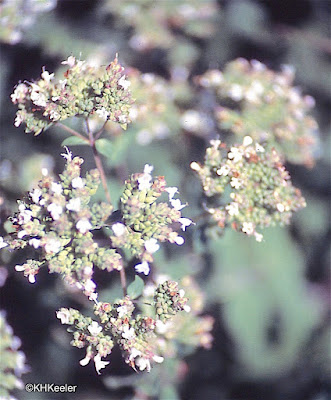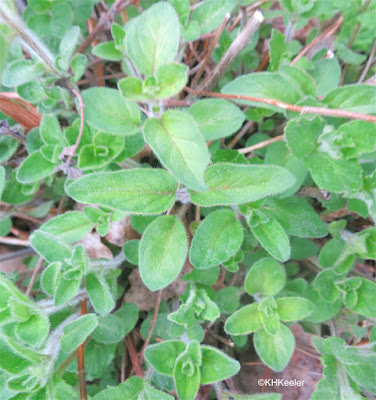When I was a beginning gardener, decades ago, I tried to grow all the spices of my kitchen shelf: sage, rosemary, thyme, oregano and so on. I have had oregano in my gardens ever since.
Common oregano, also called Greek oregano, pot marjoram, and wild marjoram, is Origanum vulgare in the mint family, Lamiaceae (also called Labiatae). Origanum is the Greek name for the plant, although you can read the more romantic explanation that it is a combination of óros and gános meaning "mountain splendor" or "mountain joy," perhaps both are true. The species epithet, vulgare, means "common." Oregano in native to southern Europe where it has a number of close relatives, such as sweet marjoram (Origanum majorana).
Current North American usage calls Origanum vulgare "oregano" but older or British sources often say "marjoram, Origanum vulgare." They suggest that the plant known to them as wild marjoram is now commonly called oregano, a word borrowed from Spanish or Latin. Thus, the name "marjoram" by itself, without the scientific name or an adjective (such as "wild marjoram" or "sweet marjoram") is ambiguous and could mean any of several related European species. At the same time "oregano" can mean the unrelated Mexican oreganos (Lippia graveolens and Lippia palmeri, verbena family, Verbenaceae) or Syrian oregano Origanum syriacum. If you like the flavor of oregano, get to know all the oreganos and marjorams.
My common oregano grew into a pretty plant. It survived the winter--a surprise because Nebraska and now Colorado are much colder than southern Europe--and gently seeds into surrounding flowerbeds.
Common oregano plants vary in flavor intensity and do not breed true; plants from seeds may not be as tasty as the parent plant. Consequently, if you plan to cook with your oregano, take a cutting from a great plant and root that. It roots pretty easily.
The common name pot marjoram refers to its use as a vegetable ("pot herb"). The tops and new leaves can be eaten, raw or cooked.
My plants mostly have uninspiring flavors, so I grow them for their beauty and buy the spice.
And they are beautiful. A nice rounded shape, cute slightly fuzzy leaves, white flowers. (Some varieties have handsome pink-purple flowers.)
Oregano has been used for two thousand years in Europe, likely longer, as a flavoring and as a medicine.
Dioscorides, a very influential Greek physician working with the Roman armies in the first century, wrote that it is warming, and good for those who are poisoned, describing treatments if bitten by poisonous beasts (oregano in wine), or poisoned by water hemlock or poppy juice (oregano as or in raisin wine) etc. For convulsions he would give it to the patient with figs. He used it in concoctions to make the patient vomit. The juice cured ear pains. It cured coughs when licked in honey and in a bath was good for itchy skin and jaundice...and so on. Strewed on the floor, it expelled serpents.
More than 1000 years later, Nicholas Culpeper, in a book of medicinal plants written for the public not doctors, wrote, "there is scarcely a better herb growing for relieving a sour stomach, loss of appetite, cough, consumption of the lungs." He repeats many of the remedies of Dioscorides and recommends a conserve of oregano (1 part pounded fresh leaves to 3 parts sugar) for flatulence, indigestion, and other disorders of the stomach.
Modern chemistry finds common oregano has many of the same compounds that are found in sweet marjoram, thyme (Thymus species) and rosemary (Salvia rosmarinus), including carvacrol, thymol and rosmaric acid. These compounds have been shown to have antibacterial and antifungal properties and some anticancer effects.
In European folklore, oregano was used in love potions; feeding it to a lover strengthened their love. Dried oregano and violets, in an amulet, were worn in winter to prevent colds. A few leaves in each room, renewed monthly, protected the house from evil. Similarly growing oregano protected the garden. while carrying it protected a person and, if the person was depressed, brought happiness.
It is a good companion plant, repelling insect pests and reportedly improving the growth of virtually all vegetables. It imparts a pleasant taste to the milk of dairy cows. The flowers attract many bees and butterflies.
A lovely plant, oregano.
Comments and corrections welcome.
References
Allardice, P. 1993. A-Z of Companion Planting. Angus & Robertson, Pymble, Australia.
Cunningham, S. 1993. Cunningham's Encyclopedia of Magical Herbs. Llewellyn Publications St. Paul, Minnesota.
Culpeper, N. original 1653. Culpeper's Complete Herbal. W. Foulsham Press, London. (My printed version says "wild" marjoram" not "wind marjoram" but here's Culpeper 1814 edition online link)
Gunther, R. J. translator. 1934. Greek Herbal of Dioscorides. Oxford University Press, Oxford. A version online at link
PDR (Physician's Desk Reference) for Herbal Medicine. Oregano. 4th edition. Thompson Healthcare, Inc. Montvale, NJ.
Plants for a Future. Origanum vulgare. link Accessed 9/30/2019
Simonetti, G. 1990. Simon and Schuster's Guide to Herbs and Spices. Simon and Schuster, New York.
Swahn, J. O. 1991. The Lore of Spices. Crescent Books, New York.
Meanings of obscure terms used by Dioscorides
T. E. Cone, Jr. 1970. Pediatrics: Infant, cretin, meconium and icterus. https://pediatrics.aappublications.org/content/46/6/870 Accessed 9/29/19
Latin dictionary psora, psorae http://latin-dictionary.net/definition/32166/psora-psorae Accessed 9/29/19
Rare diseases, NIH https://rarediseases.info.nih.gov/diseases/7480/prurigo-nodularis Accessed 9/29/19
Kathy Keeler, A Wandering Botanist
More at awanderingbotanist.com






No comments:
Post a Comment